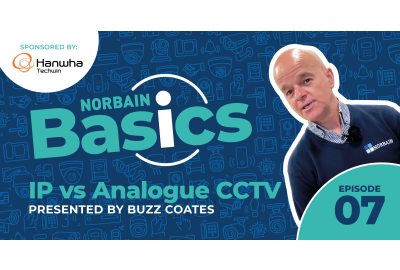IP or Analogue CCTV? Read our handy blog
Video transcript:
Hello, my name is Buzz Coates, Norbain Security Solutions Specialist and I'm here today on Norbain basic video series to talk about IP versus analogue CCTV systems.
So here in the UK, we've been installing CCTV for over 50 years and that means there's a lot of legacy cable - mainly coax.
And over the last 20 years, we've seen an increase in migration to IP products. And of course, there are pros and cons to using either.
Because of the advances in technologies, we have seen a need for people to upgrade to better resolution systems. And the path of the upgrade can go two ways - we could either use the existing cable and take old standard definition resolution, up to 1080 HD and above. Or it means that we could use that cable and then convert to what would be a typical IP system.
The advantages of the analogue system upgrade is that you can basically remove the existing DVR and cameras and replace those with what is known as 1080 HD or AHD, CVI TVI cameras.
The cable, which is in situ, can stay in place and in some cases, you can even run power over coax with some manufacturers.However, you need to be very wary - there is some coax out there, which is known as copper-coated steel. and this will cause you problem high resolution video.
And one of the main reasons why people still want to go this route of using analogue systems as you get no latency - simple as that - no delay on your video, unlike IP.
The main disadvantages of Analogue is mainly that you're not keeping up with technology.
So you will see in IP you'll get the choice of fisheye cameras, multi-sensor cameras, analytics and all the great technology where manufacturers are investing their money.
We're not seeing that now in the analogue world.
And of course, with analogue systems, we need a lot more cable because if we are using things like audio inputs and outputs, data - they tend to be separate cables. So with IP, of course, main advantages are one cable does the lot.
So again, if we want to send down inputs and output information, we want to send data, we want to send audio, we want to send power - we can all do that down the one Cat 5 / Cat 6 cable.
And of course, all the advances in technology are in the IP side of the industry as well.
IP systems in general are much easier to deploy and of course, if you want to integrate, we tend to find that integration occurs very well in IP systems, not so much in analogue systems.
And that really does follow the trend that we are seeing outside the security industry where integration - everybody wants a best return of interest.
And I think it's fair to say one of the disadvantages of moving into an IP system is you're going to have to have skill sets with networks.
And maybe if you're moving your equipment on to a server, you're going to have to have good server knowledge as well.
And don't be surprised that you will probably sometimes get systems that require both - a hybrid system, where you may be using IP and analogue on the same system.
We often see scenarios where sometimes analogue cameras have only been in for a little while and the customer still wants to use those.
But new cameras they want to move to IP, so they can go back to the same recording device, which is able to do a hybrid system.
So if you'd like to find out more, give us a shout or head over to Norbain TV on YouTube.
